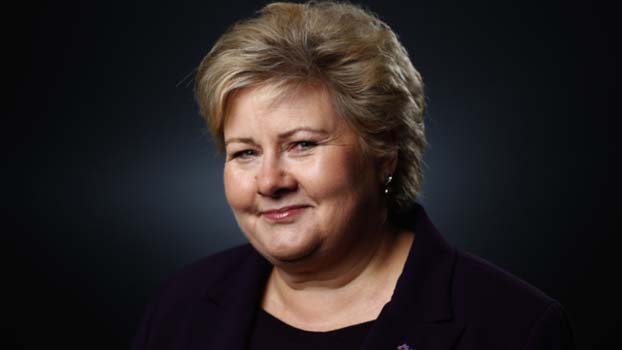A huge shift is taking place in the land of midnight sun
After 8 years of Solberg’s leadership, Norwegians are looking to the left for inspiration

In a little over a week’s time, Norwegians head to the polls to elect a new parliament in Norway. That Sep. 13 vote isn’t about whether the Conservatives led by Prime Minister Erna Solberg can earn a third term — but by how much will her party lose.
Unless there’s a dramatic collapse in current support for centre-left opposition parties, Solberg’s eight years in office will end in a whimper.
According to opinion polls that have remained consistent over the last six months, Labour Party leader Jonas Gahr Stoere will likely be leading negotiations to form a centre-left power-sharing agreement with left-leaning groups.
As Gulf News visited Norway last week, there was little outward sign of general election campaigning that has been low key — defeat for Solberg’s Conservatives is all but inevitable.
Widely praised last year for a swift coronavirus lockdown, giving Norway one of Europe’s lowest COVID-19 mortality rates globally, Solberg is facing an electoral backlash over economic inequality and public sector reforms that have proven unpopular in the nation of 5.4 million.
While other European leaders who imposed pandemic lockdowns and strict regulations on social
Widely praised last year for a swift coronavirus lockdown, giving
Norway one of Europe’s lowest COVID-19 mortality rates globally,
Solberg is facing an electoral backlash over economic inequality
and public sector reforms that have proven unpopular in the
nation of 5.4 million
gatherings were caught out by the media for breaches, Norwegian police fined the PM in April for two gatherings at a ski resort chalet and restaurant. She was turning 60 and the birthday weekend celebrations exceeded permitted parameters — and was fined 20,000 crone, roughly €2,300.
The police investigation was spurred by a report by state broadcaster NRK that claimed 13 people were at a weekend party — three more than the permitted number. For law-abiding Norwegians, where social conformity is a given, the minor breach was enough to taint her leadership.
While police would not have issued a fine in most such cases, they said the prime minister has been at the forefront of the government’s work to impose restrictions, with the nation’s top policeman noting wryly: “Though the law is the same for all, all are not equal in front of the law.”
The timing of the offence coincided too with a spike in infections and deaths, which forced the government to tighten restrictions in late March.
According to opinion polls that have remained largely consistent since then, Solberg’s Conservatives and her centre-right allies in coalition are on course to win just 55 seats in the 169 parliament in Oslo. They head into the election on Sep. 13 with 88 seats.
The centre-left parties that Stoere, a millionaire who previously served as Norway’s foreign minister, hopes to build a coalition on are on course to win 114 seats — up from the 81 they hold going into the election.
In a nation with one of the highest per capita incomes globally, tax rates are high and Stoere’s Labour party has gained traction with promises of tax relief for low and middle income families, an end to privatisation of public services, more money for hospitals and a tax hike on the top 20 per cent of incomes.
The polls show the Greens increasing their seats, and so too the far-left Red — with both parties looking at loosening the tight controls that are in place on Norway’s $1.4 trillion (Dh5.14 trillion) sovereign wealth fund — the world’s largest.
Oil and gas revenues
Despite the global pandemic, the value of the fund set up 25 years ago to manage oil and gas revenues from the North Sea, has been surging. In the first six months of 2021, it grew by $111 billion. According to figures from the OECD, the average Norwegian worker saw 27.4 per cent of his wages go in taxes, compared to 24 per cent across the rest of the European Union.
Norway belongs in the wider European Economic Area that covers the 27 nation states of the EU along with Iceland, Lichtenstein and Switzerland — a customs union that allows for the movement of goods and services in the area covered by Schengen visas.
Indeed, that relationship with Bussels is one of the main issues in the low-key campaign.
The outgoing PM has said that Norway should not try to renegotiate the terms of its membership of the European single market as some opposition parties argue, and she cites the tough negotiating stance adopted by Brussels in Brexit talks as one reason why the
Scandic nation’s Eurosceptics are misguided.
The Centre Party, led by farmer Trygve Slagsvold Vedum, is promising to decentralise government functions and bring jobs and prosperity to rural parts of Norway. It has tapped into support among farmers and rural Norwegians who say their concerns are not being heard in Oslo — almost an echo of trends seen elsewhere in Europe and North America.
It opposes Norway ever joining the European Union and wants to replace its single market affiliation with a set of traditional trade agreements and more national autonomy. Twice before, in 1972 and 1994, Norwegians have rejected full membership of the EU.
While the Centre and the Socialist Left parties want Norway to leave the European single market, Labour is opposed to it. A majority of Norwegians polled in recent surveys support membership of the single market.
Vedum says that regardless of the outcome of next week’s election, he views himself as a prime-ministerial candidate and will try to form a coalition of his own, opposing Stoere’s attempts.
Mick O'Reilly is Foreign Correspondent at Gulf News.



